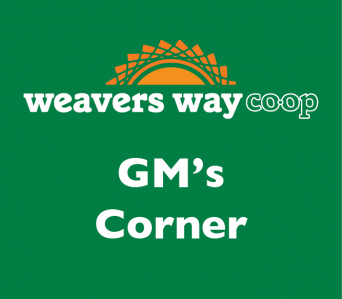
GM's Corner: Planning for Continued Home Delivery Growth After the Pandemic
“Plans are of little importance, but planning is essential.” — Winston Churchill
Churchill didn’t have to deal with the coronavirus pandemic, but we don’t have to deal with the Luftwaffe, so perhaps it’s a wash.
As we all prepare to say goodbye (or is it good riddance?) to 2020, here at Weavers Way, we’re planning for 2021 and doing our best to anticipate what the New Year will bring. Long-term planning is always a tricky business, and the pandemic makes it even trickier, but it really is essential to think about what comes next.
While the man who is (for just a bit longer) President of the United States, forever unencumbered by facts, says we’re “rounding the corner,” more responsible folks expect the pandemic to continue to impact our lives well into 2021.
For the Co-op, that means continuing to operate in “contingency” mode — customer caps, social distancing, compulsory mask wearing, and so forth. Still, with vaccines on the way, it’s not unreasonable to begin thinking about how our business will change post-pandemic.
An industry the size of ours — grocery store sales exceeded $700 billion last year — has no shortage of experts, prognosticators, forecasters, and seers. Dozens of trade publications — Supermarket News, Progressive Grocery, Deli Market News, WholeFoods Magazine, to name a few — have spilled oceans of ink trying to prepare the industry for a “new normal.”
Most experts agree things won’t go back to the way they were before the pandemic, at least not completely. For example, hot bars might be history. Same with things like self-service soup stations. Going forward, some people might feel more comfortable wearing masks whenever they shop, as is customary in some parts of Asia. Grocers will probably have to keep hand sanitizing stations throughout their stores.
But no subject has been given more attention than the future of home delivery.
Before the pandemic, home delivery was the fastest growing segment of the grocery industry. Most experts, however, believed home delivery of groceries was of more limited appeal for most people than, say, books or clothes. When it comes to grocery, home delivery would mostly be limited to non-food items such as trash bags and laundry detergent, pet food, and packaged items such as breakfast cereals and canned goods.
Fresh foods would remain the domain of brick-and-mortar businesses. When it comes to fresh food, people rely on their senses: how things look, smell, and feel. People like to inspect before they buy.
But the pandemic has called all of this conventional thinking into question. Home delivery and curbside pickup sales have gone through the roof. At the Co-op, a service that was previously offered to a handful of mostly aged or infirmed members has now become a core part of our business. After peaking at about 16% of our total sales back in April, it’s now settled in at about 7%, or around $2.5 million annually. Not insignificant.
Will demand for home delivery go down once the pandemic is over? Most industry experts say yes, but they caution that many consumers have caught the online bug and will permanently weave online shopping into their grocery buying patterns.
Online grocers sense the opportunity. Amazon is rapidly building more and larger grocery fulfillment centers, facilities specifically designed to maximize the efficiency of “order picking.” In the grocery biz, where profits are razor thin, keeping labor costs as low as possible is fundamental to profitability.
What’s a brick-and-mortar grocer like Weavers Way to do? For starters, we must recognize that we can’t choose to opt out of the home delivery business. Capitulating online sales to the Amazons of the world is a losing proposition.
We need to recognize our strategic weaknesses. Our stores are set up as retail operations, not for online fulfillment. While an Amazon fulfillment center is designed by really smart people with online ordering in mind, our stores are not. We will never be able to achieve their level of labor efficiency.
But we can play to our strengths, the biggest being this: Industry pros believe online grocery shoppers will continue to also shop in store. They may shop online one week, in store the next. These consumers will shop online at stores they know and trust. A good in-store shopping experience will boost online sales.
The opposite is also true. Shoppers who have a positive online experience will be more inclined to visit a retailer’s physical operations. So, stores like Weavers Way need to invest heavily in our digital platforms, making them as user friendly as possible and giving customers choices for things such as substitutions and out-of-stocks.
Ultimately, online sales present us with an opportunity. The internet is a new “door” to the Co-op, a way for us to reach customers we otherwise wouldn’t be able to reach. For the grocery industry, online sales are the new frontier.
We must plan accordingly.
See you around the Co-op.
